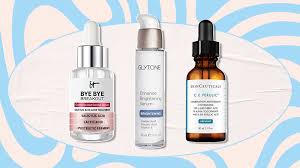
Which serum is best for aging skin?
It’s fun to think back to the days before serums were introduced. People wondered how we could have a skincare routine without at least one of the most effective ingredients. But which of the hundreds of serums are best for aging skin? Finding one can be a daunting task, but we’re here to help!
How to choose a serum for your face?
Serums are known to penetrate deeper into the lower layers of the skin, just below the epidermis, to address skin concerns like pigmentation, blemishes, and aging. If you find that these issues need to be addressed and your existing routine isn’t doing the trick, they make for the perfect skincare product!
The best way to choose a serum for your face is to first consider your skin type and the results you’d like to see after using this new serum every day. There are a few effective skin ingredients in high-performance serums, but the main ones to look out for when it comes to fighting signs of aging are as follows:
Retinol – Retinoids can counteract many of the signs of aging you may be experiencing, such as fine lines and wrinkles, uneven texture, and loss of collagen and elasticity in your face. This ingredient is so potent that it must be applied to the skin in the right way to avoid irritation or skin reactions.
Vitamin C – As skin begins to age, the skin cell renewal process slows down, making the complexion look dull, grey and lackluster. By adding a serum containing vitamin C, you can add vitality to your face and restore your skin’s youthful glow.
Hyaluronic Acid – Hyaluronic acid provides a lot of moisture to the skin, making the face look super plump and elastic, fine lines are smoothed out, and the overall appearance is smoother.
Lactic Acid – This AHA is great for sensitive skin, it removes the dead skin cells that build up on the skin, making it look older than it actually is, without causing any skin reactions.
These are some of the most effective ingredients to look for when searching for an anti-aging serum. When introducing a brand new ingredient to your skin, you should always do a 24-hour patch test before applying the product to your entire face to avoid any adverse skin reactions.
At what age should I use a vitamin C serum?
The key to anti-aging treatment is prevention. So if you start adding a vitamin C serum to your routine from the age of 25, you will be on the right path to younger-looking skin. Vitamin C is known to cause skin irritation, especially when exposed to UV rays. Using products with an SPF of 30 or higher every day can prevent this. Apply 50p to your entire skin every day before you go out with your makeup on, even on cloudy and rainy days, as UVA rays are always there.
Do I need a serum and moisturizer?
Moisturizers and serums work on different layers of the skin and generally provide slightly different benefits to the skin. Serums can penetrate deeper into the skin and target areas that creams can’t reach. They can address deep-seated skin issues without you having to worry about them. The beauty of moisturizers is that they balance and restore the skin’s protective barrier, providing a protective layer for the face that can protect against all environmental aggressors such as pollution, bacteria, dirt, and other free radicals.
Both products work wonders for the skin. So when it comes to which is best, I personally would say: both. However, if your budget only allows for one, it’s better to invest in a serum because the active ingredients in it are more effective and will improve the skin faster than using a moisturizer.
Which is better for wrinkles, retinol or hyaluronic acid?
For a comprehensive treatment to combat all signs of aging, I always tend to recommend retinol. If you find that there are more issues to address, such as loss of elasticity or firmness in your skin, retinol is the best solution. If you use it responsibly and do enough research, you will see results in about 6-8 weeks.
If you want faster results, hyaluronic acid is extremely hydrating for the skin and can work instantly. For a smooth, youthful complexion. This is also because dehydrated skin is often mistaken for aging skin, and any visible fine lines will be plumped up after using a serum rich in hyaluronic acid.
Both of these skin-changing ingredients are so beneficial to the skin that they can actually be used together without causing any reactions or irritation. Try to use hyaluronic acid during the day, as you don’t want to waste those instant results while you sleep. Keep retinol for your evening routine to keep this powerful ingredient at its best while not compromising its effectiveness due to UV rays. You’ll get the benefits of both powerful products without overloading your skin. It’s a win-win, and your skin will thank you!
Should I use a facial serum every day?
Absolutely! Face serums are extremely beneficial for the skin and should be used daily or at night, depending on the active ingredients included in the formula. There’s nothing wrong with using a variety of different serums depending on what your skin tells you throughout the day. Remember: the most expensive serum in the world may not work as expected if you don’t cleanse your skin daily. Make sure your skin is clean and free of makeup. Remove layers of dead skin cells, residue, and foundation before applying a serum so it can do its job. You can also vary the serum you use daily depending on what your skin lacks or what you need to look and feel its best.
Here’s where you’ll learn about the best serums for aging skin! Aging affects the skin in many ways, so considering the various active ingredients found in a good serum is a godsend. You might even be asked what your secret is, but what you tell them is completely up to you!


